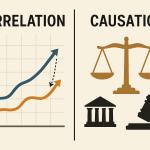Many people, including government officials and members of the judiciary, commonly confuse correlation with causation, although they are critically different.
Correlation
#This article is reprinted with permission of the author and the Cato Institute. The original blog post can be found here.
Myopia, commonly called ‘nearsightedness’ because of the difficulty focusing on distant objects is a leading cause of visual disability and has a rapidly growing prevalence – 30-50% of Western adults and up to 80 or 90% among high school students







